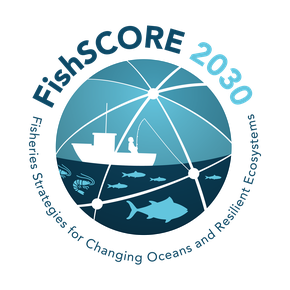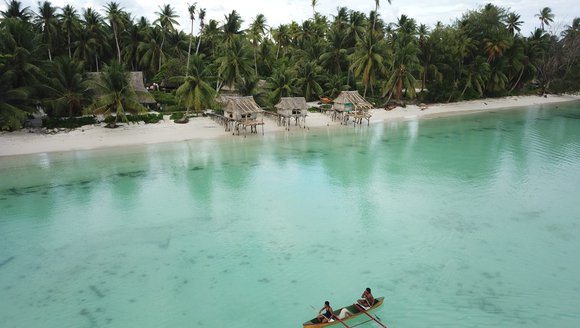Collaborative Projects that Increase Climate Resilience
Supporting climate resilience efforts.
FishSCORE2030 aims to facilitate and enhance partnerships in local and regional fisheries around the world to co-develop fishery-specific and context-appropriate climate resilience strategies.

Goals:
- Support ongoing local and regional efforts to sustain and expand fisheries as a food source, cultural identity, and economic benefits.
- Facilitate scientist-practitioner collaborations to carry out applied research.
- Support learning opportunities among different research efforts through the FishSCORE2030 Network and the UN Ocean Decade.
- Synthesize current research and resources available to inform climate resilience fisheries practices and policies..
- Apply lessons learned from local climate resilience assessments and strategy development efforts to refine and revise decision support tools.
Strengthening climate resilience in fisheries through support of existing work and through new projects
FishSCORE2030 supports existing efforts and new projects to achieve adaptive decision-making and planning in fishery systems. Projects focus on different aspects of transforming fisheries systems for climate resilience, including elevating the voices of marginalized individuals in fisheries practices and management, advancing data collection and modeling needed to inform our understanding of climate impacts on fisheries, and employing frameworks for evaluating climate impacts, vulnerabilities, resilience attributes, and opportunities in specific fisheries.
As a UN Ocean Decade program, FishSCORE2030 is an umbrella for projects and activities with similar objectives or synergistic goals. Explore the projects below:
- Southern Gulf of Guinea Upwelling System (sGGUS) will use the coupled physical-biogeochemical model to assess the impact of long-term variability and climate change on the sGGUS. A comparative analysis with other Atlantic upwelling systems will provide insights for sustainable fisheries and climate resilience strategies. Institut National de Recherche en Sciences Exactes et Naturelles (IRSEN) – Congo.
- Transnational cooperation for diadromous fish (DiadSea) is a transnational cooperation initiative of 9 beneficiary partners and 28 associated partners from 4 European countries that is aimed at improving the management and conservation of diadromous migratory fish at sea in the Atlantic Area. By protecting these fish and their habitats, DiadSea will not only help the environment but also bring benefits to local communities, both economically and culturally. MARE/University of Évora – Portugal.
- Sea Change Australia brings together fishers, aquaculture producers, industry, managers, and researchers to facilitate knowledge exchange and co-develop climate-resilient options for strong and healthy fisheries and aquaculture sectors in Australia. University of Tasmania – Australia.
- Co-Management Models for Fisheries & Ocean Health (Co-Management2030+) will work to enhance fishermen and other stakeholders on understanding and engaging with co-management, providing capacity building and knowledge exchange, in support of gender equity, participation and the effective climate resilient management of ocean resources, recognizing co-management as a path for the science we need for the Ocean we want. Conectar para Conservar/Connecting People Conserving Nature – Chile.
- System and Application for Excellence: sehaT Untuk Nelayan IndonesiA (SAFE TUNA) uses a mental health app to help manage the mental health of fishers and their family member in Indonesia. Participatory action research methods are used to encourage transformative actions and includes information such as marine and environmental protection, spatial information, fish and fishing gear prices, addresses of the nearest health facilities, and household budget guidance. Universitas Padjadjaran – Indonesia.
- Trophic Cascades in Coastal Ecosystems (CASCADES) is researching ecological connections between marine and terrestrial environments and find how anthropogenic impacts like fishing pressure can transfer from land to sea via food-web connections. Norwegian Institute for Nature Research (NINA) – Norway.
- Adaptive Fisheries Assessment in a Changing Ocean (SAP) has been carrying out an intensive and continuous monitoring program of the fishery resources of the Catalan coast since 2009, with the aim to provide scientific data for best management practices. ICATMAR — Government of Catalonia — Spain.
- Small fisheries management in coastal Mozambique (SFMCM) will contribute to better management of small-scale fisheries and coastal ecosystems by reducing illegal and unsustainable fishing methods and providing alternative sources through investigating alternative fishing methods. Mozambique Oceanographic Institute (InOM) — Mozambique.
- Seafood Free: Seafood Fishery Resource Ecosystem Engineering is implementing a conceptual framework to rebuild the wild population of large yellow croaker in the East China Sea. Zhejiang Ocean University — China.
- Building ADAPtive rESilience of Spanish fisheries (VADAPES-II) is assessing the socio-ecological resilience of the fisheries sector in two Spanish fisheries to climate change to identify priority adaptation and mitigation actions. Centro Oceanográfico de Baleares, Instituto Español de Oceanografía (IEO-CSIC) — Spain.
- Costa Rica and Honduras collective action for the implementation of the Voluntary Guidelines is working for the sustainability of small scale fishing in the context of food security and poverty eradication. CoopeSoliDar R.L.
- Climate-smart strategies to develop resilience in artisanal fisheries of Mediterranean Marine Protected Areas (CLISSARTES) is assessing the climate risk exposure, the connectivity, the vulnerability of commercial fishing species in Mediterranean MPAs and their associated socio-economical costs. Spanish Institute of Oceanography, Spanish National Research Council (IEO – CSIC).
- The Western Indian Ocean (WIO), Productivity under climate change is researching ocean system dynamics to understand the impact of climate change on marine species. Kenya Marine Fisheries Research Institute.
- Bioregional Resilience: Professional Coastal-zone Resource Management (CRM) Planning is working to standardize the knowledge base and related skills to initiate Marine Spatial Food Security Planning for fisherfolk and approximately 10 million linked beneficiaries across the 10 North Philippine Sea Provinces. Daluhay — Daloy ng Buhay.
Through the FishSCORE2030 Network, collaborators may also develop new projects with local and regional practitioners to advance information resources, synthesis products, and other activities to support climate resilience. A developing set of projects will conduct benchmark assessments of resilience to projected climate impacts, evaluate actionable strategies for enhancing resilience, and support fishers and fishing communities in sustainability initiatives. Future projects may include advancing ecosystem conservation goals, social and economic objectives, and sustained and equitable flows of benefits. We expect these projects will be connected and organized with partners from fishery management or non-governmental organizations. This arrangement will help provide a pathway towards longer-term and broader use. The results of these projects will be used to iteratively refine and revise the tools and recommendations that FishSCORE2030 will develop.
There is currently an open Call for Actions by the UN Ocean Decade for new projects. FishSCORE2030 is soliciting new projects to be hosted by the program as part of this call for proposals. For more information, please visit the UN Ocean Decade Call for Actions.
If you are interested in developing a project in conjunction with FishSCORE2030 or sharing information about your work with the FishSCORE Network, please reach out to a team member listed below.
Return to the FishSCORE2030 home page.
Coordination Group
Upcoming FishSCORE2030 Events
Read More
-
FishSCORE2030: Supporting Climate-Resilience in Fisheries
GMRI Research Scientist Dr. Kathy Mills is leading a new collaborative effort to build an international network of scientists, stakeholders, and practitioners who will identify …
Tidings
-
Supporting climate-resilient fisheries during the UN Decade of Ocean Science
A new “Food for Thought” study, which we contributed to and which has been published in ICES Journal of Marine Science, outlines FishSCORE’s strategies and …
Press Clips
-
GMRI Scientist Awarded Prestigious CINAR Fellowship
Senior Research Scientist Dr. Kathy Mills is one of four researchers awarded the CINAR Fellowship in Quantitative Fisheries and Ecosystem Science.
Announcements
-
New: Climate & Fisheries Planning Tool
The Science for Nature and People Partnership (SNAPP) working group on climate-resilient fisheries, led by GMRI Senior Research Scientist Dr. Kathy Mills, recently developed a …
Tidings



